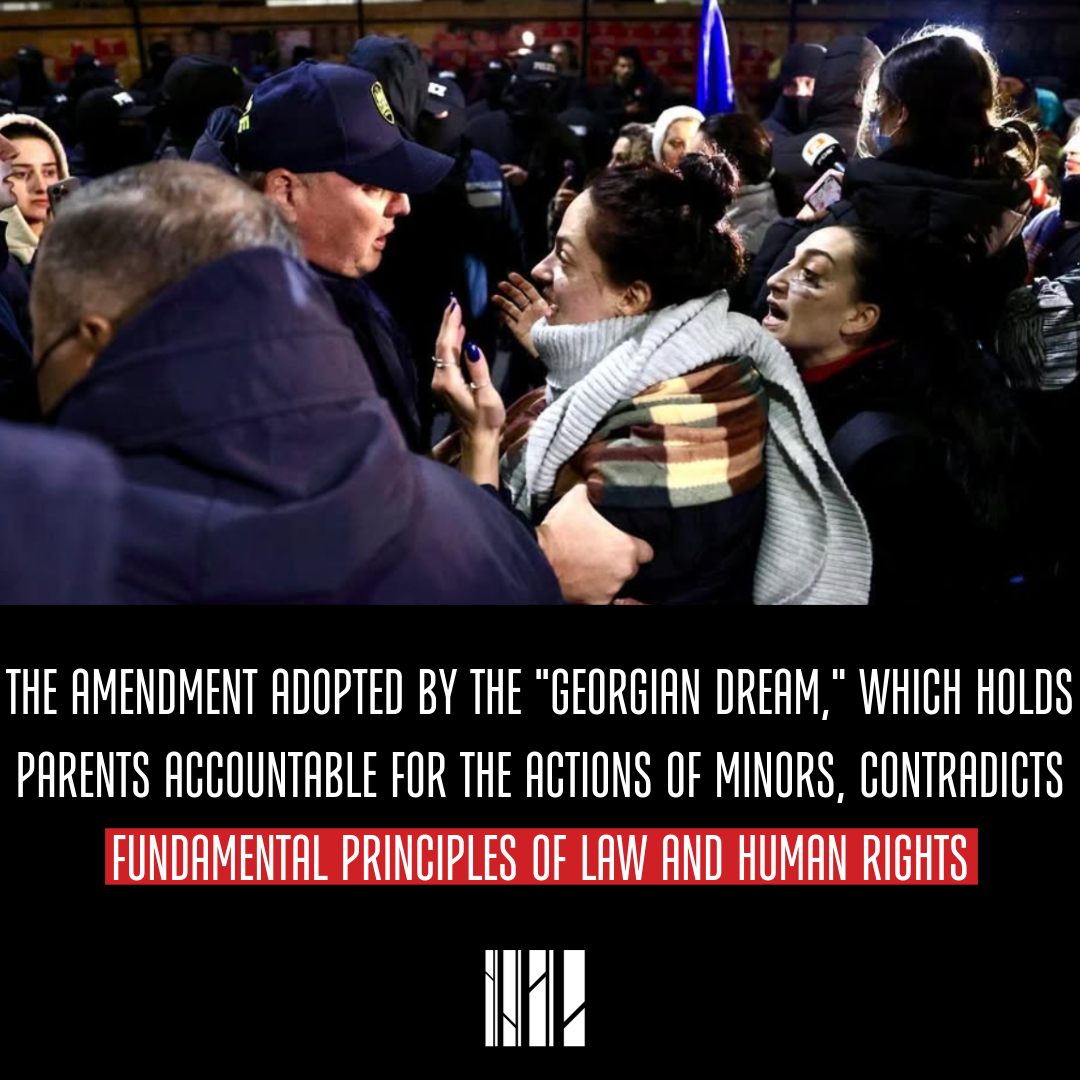საერთო ცხელი ხაზი +995 577 07 05 63


The Social Justice Center is responding to the legislative amendments adopted by "Georgian Dream" on December 13 through a simplified procedure, which place responsibility on parents for the actions of minors. We believe that these amendments entirely disregard fundamental principles of law and come in conflict with both the rights enshrined in Georgia's Constitution and the country's international obligations.
The legislative amendments add a provision to Article 172[1] of the Administrative Offenses Code of Georgia, according to which a minor’s failure to comply with a law enforcement officer's lawful request will result in a fine of 100 to 300 GEL for their parent or legal guardian.
Furthermore, parents or legal guardians will also be fined if a minor violates regulations on the use of pyrotechnics, including the purchase, possession, or use of pyrotechnic products by individuals not authorized to do so under the law. This regulation will be added as a new Article 1564 to the Administrative Offenses Code of Georgia and is part of the legislative amendments package adopted through an expedited procedure.
Article 172 of the Administrative Offenses Code of Georgia, which imposes fines on parents or legal representatives for the actions of minors, contradicts both Georgia's domestic legislation, as well as, international standards of juvenile justice. Moreover, these amendments could potentially be used as a tool to suppress protests, especially given that minors are actively participating in ongoing demonstrations and, in recent days, have been among the many peaceful protesters who were detained.[2]
The Juvenile Justice Code, which regulates the administrative liability of minors, the procedures for handling administrative offenses involving minors, and the enforcement of penalties and other measures, stipulates that the minor's best interests must be the primary consideration in juvenile justice processes.[3] According to Article 68, Paragraph 1 of the same Code, a fine may only be imposed on a minor if they have an independent income. This provision does not allow for fines to be imposed on a parent or legal representative for the actions of the minor.
Furthermore, until January 1, 2016, Article 42, Paragraph 51 of the Criminal Code was in force, which stipulated that if a convicted minor was found to be insolvent, the court would impose the fine payment obligation on their parent, guardian, or custodian.
With the adoption of the Juvenile Justice Code and the repeal of the mentioned article of the Criminal Code, the legislature established the principle that punishment must be individual and should not extend to third parties, such as parents or guardians. The amendment to Article 172 of the Code of Administrative Offenses disregards this principle and once again places responsibility for offenses committed by minors on the parent or legal representative.
According to Article 3 of the UN Convention on Children’s Rights[4], the best interests of the child must be the primary factor considered by public or private institutions, courts, and administrative or legislative bodies when making any decisions or taking actions. Furthermore, under Article 40 of the same Convention, measures applied to minors should be proportionate, reparative, and focused on rehabilitation.
The legislative amendment proposed by "the Georgian Dream" is repressive and fails to uphold the principle of safeguarding the best interests of minors. The proposed amendment, through imposing penalties on parents or legal guardians, does not genuinely aim to protect the best interests of the child but rather focuses on punishing the parent, this in turn contradicts the principles of proportionality and individual responsibility.
Furthermore, the proposed draft law does not directly prohibit minors from participating in protest demonstrations; nonetheless, the imposition of penalties on parents and legal guardians may serve as a coercive measure to dissuade minors from engaging in such activities. Accordingly, the proposed regulation is likely to have a negative impact on minors' rights to express their opinions and participate in peaceful assemblies, as guaranteed by Articles 14 and 15 of the UN Convention on the Rights of the Child. The amendments are especially concerning due to the context in which the police enforce Article 173 (noncompliance with a lawful order by a law enforcement officer), which will become the parental responsibility, in a repressive and unwarranted manner against protest participants. The court, for its part, consistently aligns with the positions of law enforcement authorities without examining evidence further.
The amendments to the Administrative Offences Code of Georgia will serve as a tool of financial coercion against families in the hands of the "Georgian Dream" and are likely to be employed on a large scale to weaken resistance. The adoption of these amendments today, further confirms that all institutions in Georgia are under full party control. The legislative authority, which should serve to protect the public interest and address state objectives, is instead engaged in the expedited adoption of unconstitutional and detrimental to the public laws aimed at weakening protests.
[1] https://info.parliament.ge/file/1/BillReviewContent/373178
[2] https://publika.ge/adgilobrivi-mediis-cnobit-qutaisshi-aqciaze-arasrulwlovani-daakaves/
[3] Juvenile Justice Code, Article 4
[4] Available at the following website: https://www.unicef.org.uk/wp-content/uploads/2010/05/UNCRC_PRESS200910web.pdf
The website accessibility instruction